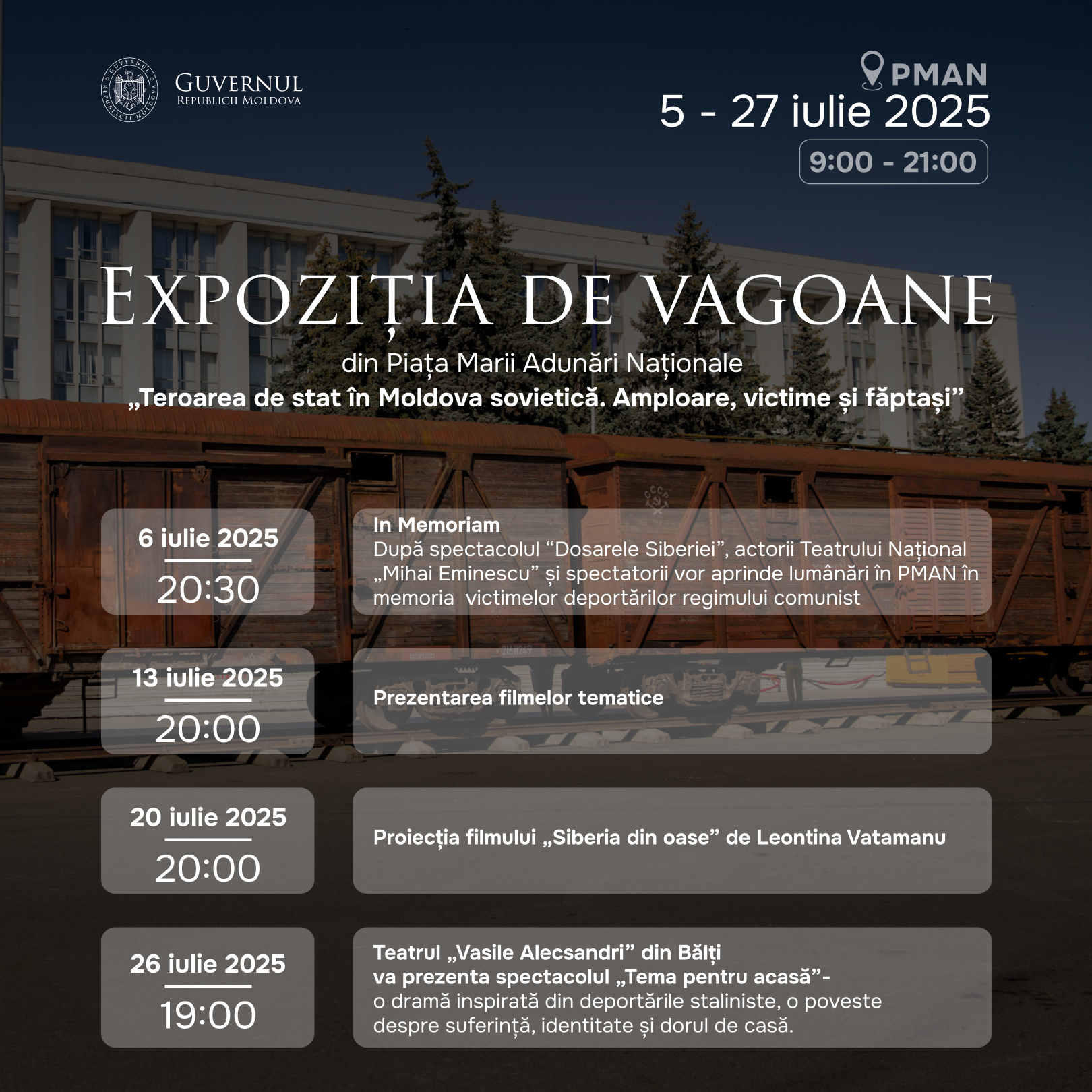
Government announces launch of train exhibition in PMAN
On 5 July, starting at 8:00 PM, the Government will organize the inauguration of the train exhibition 'State Terror in Soviet Moldova. Scope, Victims and Perpetrators' in the Great National Assembly Square (PMAN). The event will be attended by President of the Republic of Moldova Maia Sandu, Speaker Igor Grosu, Prime Minister Dorin Recean, historians, culture people, ministers, and deputies.
The exhibition, now in its third edition, will include two train cars similar to those in which people were deported to Siberia and will run until July 27th. In one of the cars, documents, photographs, books, and various objects illustrating the experience of all those repressed by the Soviet regime will be displayed, while in the second car, visitors can view an exhibition dedicated to the famine of 1946-1947 and more multimedia content. Additionally, visitors will be able to view a virtual exhibition through VR technology.
On 6 July, from 8:30 PM, around the exhibition in the Great National Assembly Square, citizens are invited to participate, alongside actors from the 'Mihai Eminescu' National Theater, in a commemoration where they will light candles in memory of the victims of the communist regime's deportations.
The exhibition's program includes, in addition to daily visits from 9:00 AM to 9:00 PM, several special events. On 13 July, thematic films from the National Archives reserves about Soviet repressions will be presented, and on July 20, the feature film 'Siberia in the Bones', directed by Leontina Vatamanu, will be screened.
The exhibition is organized by the Government of the Republic of Moldova - State Chancellery and the Ministry of Culture, with the support of the Ministry of Internal Affairs, the National Archives Agency, and the General Directorate for the Administration of Government Buildings.
The mass deportation from July 6-9, 1949, was the most extensive on the current territory of the Republic of Moldova. The operation encompassed 11,281 families, with the forcibly relocated contingent in cattle cars comprising 35,796 people, including 11,889 children, 14,033 women, and 9,864 men.
Father's Day celebrated for first time in Moldova
PM visited fruit and vegetable processing factory in Orhei
Prime Minister visited agricultural household in Mălăiești village, Orhei district
Head of State participated in National Folklore Festival 'La Nistru la Mărgioară'
Over 100 entrepreneurs receive grants
Moldovan president congratulates graduates of Moldovan State University's Law Faculty
President on working visit to Rîșcani district
PM discusses with guesthouse, restaurant owners of central Moldova district
Moldovan Foreign Affairs Ministry strengthens capacities: process of concluding international treaties analyzed at round table
Moldovan head of state congratulates the USA on Independence Day
Salaries of over 10,000 social workers increase by 12 per cent in Moldova
Moldovan president writes Ukraine needs more support
Moldovan Central Electoral Commission says State Automated Information System, Elections, secured, cannot be manipulated
VIDEO // Moldovan government next week to approve single document Europe is Close Programme
Disinformation alert: Fake document attributed to President spreading online
Open access to Soviet repression archives
Moldova to have first electrified railway: Iași – Ungheni line modernized with EU support
Regional stabilization leads to fuel price drops in Moldova
PHOTO GALLERY // 2025 Baccalaureate Awardees - Recognition for Excellence
INTERVIEW MOLDPRES // Paun Rohovei, Ambassador of Ukraine: "Moldova–EU Summit conveys clear signal - Chisinau stays firm on path of European integration''
Today in Chișinău, we are making history! – Former Minister's message on first official summit Moldova – European Union
Government spokesperson on Moldova-EU Summit
Government announces launch of train exhibition in PMAN
United States of America marks Independence Day
VIDEO // Students who got perfect score at Baccalaureate exam awarded at festive event in Moldova


